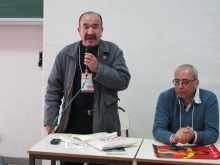No social progress without independent unions

Speakers explored and debated the roles trade unions must continue to play in the coming years to anchor democracy within the MENA and other regions and the challenges they are facing. Kamal Abu Eitta (RETA), Rachid Malaoui (SNAPAP), Anan Qadri (HSU-PGFTU), Jueia Batista (CUT), Daniel Van Daele (FGTB), Guiseppe Valentino (CGIL Calabria) and others made a strong plea for powerful unions that can defend workers’ rights.
Kamal Abu Eitta (RETA) (photo, left) spoke about the continued restrictions of union members’ rights and the right to protest in Egypt. Still, he contends, the independent unions are the main venue for achieving the just goals of the revolution. “We consider that workers’ fundamental right to freedom of association is also linked to freedom of women and all other members of society. The authoritarian regime persists, and no real revolutionaries have come to positions of power. We must all struggle together for a new type of globalisation built on a foundation of human rights.”
Rachid Malaoui (SNAPAP), Algeria, recounted the challenges SNAPAP faces as an independent union which refuses to identify with government, military or religious interests. Instead, SNAPAP focuses on building a network by supporting civil society, women, youth and unemployed workers. Malaoui credits Public Services International for its strong support for the establishment of independent unions across the MENA region. However, he notes, after SNAPAP expressed support for RETA, SNAPAP union representatives have been barred from entering Egypt. Malaoui advises trade union colleagues in Tunisa, Egypt and elsewhere to look for political solutions, and not to the army, to support progressive change.
Several speakers drew attention to the urgent need for unions to work together, both within countries and across borders. The Italian and Congolese representatives hoped for a more unified trade union movement. Some speakers referred to the historical context in which the trade union movement was born and the need to cooperate with other civil society organisations to lobby more effectively when social dialogue does not lead to desired outcomes.

